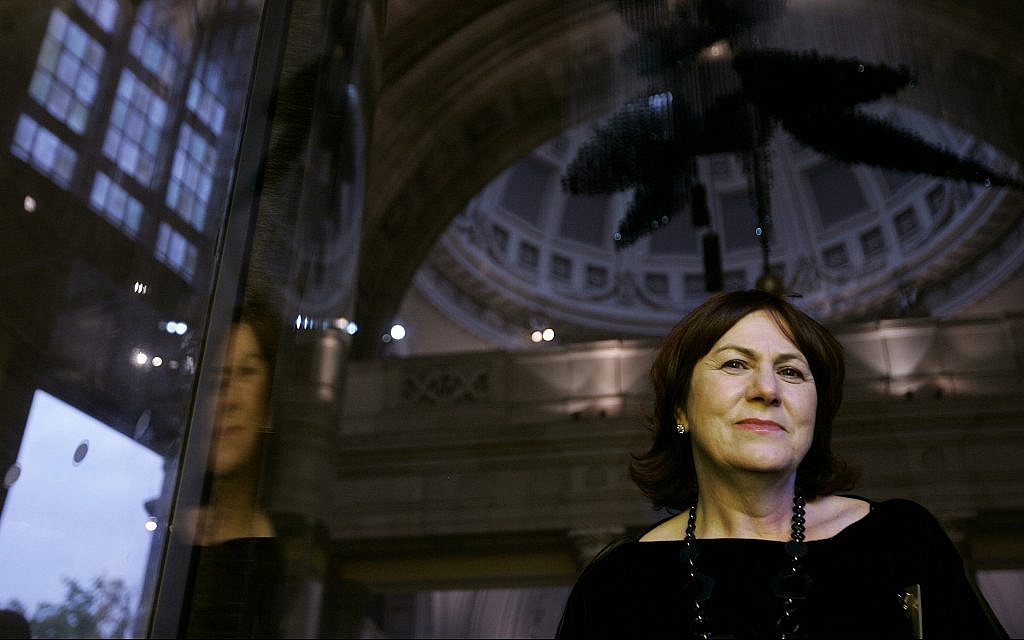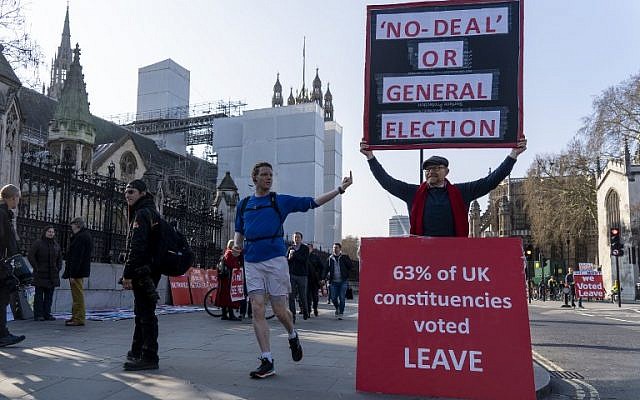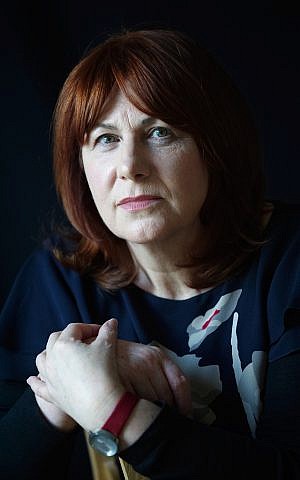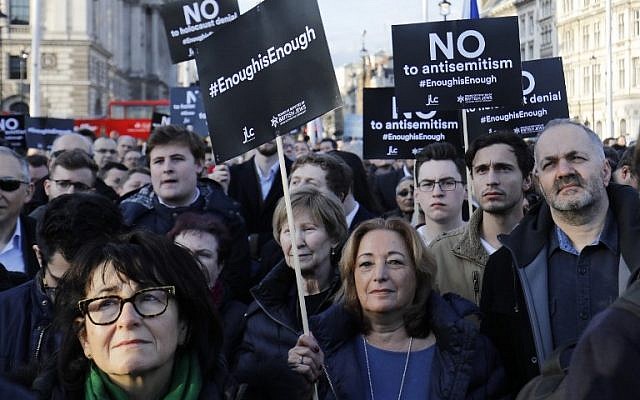Award-winning author Linda Grant tries to make sense of a country split by anger and betrayal, writing along the way a worst-case scenario that is disturbingly true to life

LONDON — Three years after Britain voted to leave the European Union, the twists and turns of Brexit have come to resemble a fiction writer’s plot. Two prime ministers have been forced from office; the country is riven by division, anger and charges of betrayal; and the new deadline for the UK’s departure has been appropriately set for Halloween.
Perhaps, then, it takes a novelist of the caliber of Linda Grant to make some sense of it all. The award-winning Jewish author began writing her latest book, “A Stranger City,” in the aftermath of the June 2016 referendum. Casting an uneasy pall throughout the novel are the fear, tumult and anxiety that the vote has provoked in many Britons.
“I didn’t want it to be a novel where people talk about the politics of Brexit. It’s a novel where people’s lives are affected by Brexit,” she says. “Things happen because of the changes in the environment, the atmosphere, and the mood of the country.”
That mood, believes Grant, isn’t a positive one. “I started writing it about two or three months after the referendum. There’s no doubt that from very early on I was aware of the increase in xenophobia, so what I did was crank that up,” she says.
The book centers around the discovery of the body of an unidentified woman tangled in the chains of HMS Belfast, a World War II destroyer moored on the Thames and which now serves as a museum.
Grant’s inspiration was a story she covered in 1992 to tie in with a TV documentary about pauper’s funerals. She attended the burial of a woman – on “a very foggy, cold, miserable” Christmas Eve – who had committed suicide after throwing herself off London Bridge.
“I’ve never really forgotten it: being buried in an unmarked grave with an unmarked coffin, and I always thought it was the subject for something, but I wasn’t really sure what,” Grant says.
That subject came to her after the referendum, when Grant started to think about “people’s ideas of home and where we belong.” She contacted the makers of the original documentary and discovered that, nearly 30 years on, the woman had never been identified. “That was my starting point,” Grant says.

The novel’s title, she says, is deliberately ambivalent, speaking to both “the strangeness of the city and [it being] a city of strangers.”
“So many people I know have come to London from somewhere else and are not native-born Londoners,” she says. “They come to London for work, for education; they come as refugees, as immigrants. They’re leaving the past behind them and so there are weaker connections between people in London than I think there are in other cities.”
Beautifully written with a tightly woven plot, the book moves on to bring together a diverse, seemingly unconnected group of Londoners. Although she herself has lived in the city for over 30 years, Grant was brought up in the northwest city of Liverpool. Many of the characters in “A Stranger City” are likewise not originally from the capital: Chrissie, an Irish nurse; Marco, whose father is Lebanese; and Francesca, the granddaughter of Persian Jews who fled their home country at the time of the 1979 revolution.
There is, Grant agrees, a “faintly dystopian” edge to the book: prison ships (“floating concentration camps, let’s give them their right name” remarks one character) confine illegal migrants in the Thames estuary before they are ejected to the European mainland; deportation trains trundle through the night; and the country is blanketed in snow for weeks. Terrorists strike in an attack reminiscent of those which occurred in London two years ago, while the book is punctuated by incidents of racism, both casual asides and vicious assaults.
The notion that Britain – or, more accurately, England – is shrinking in on itself is ever-present. One character speaks of being “stuck on this tight little island,” while another refers to the country becoming a “whites-only rump state.” A third characterizes it as a “a time machine taking us back to the past.”
But Grant most closely identifies with the description of life in Brexit Britain as akin to “being on a plane during a long bout of turbulence with a bunch of half-trained amateurs in the cockpit and no guarantee that you were ever going to land.”

“That is exactly how it feels to me,” she says. “I put into Marco’s father’s mouth my own feelings of fear that I don’t know where any of this is going to wind up.”
“When I started writing, my assumption was the referendum happened, we’re going to leave the EU and it’s just a matter of whether it’s a hard Brexit or a soft Brexit,” Grant recalls. “What I couldn’t possibly have predicted was the chaos, the mess, the extreme difficulty of leaving the EU, the political ramifications of it; the fact that, a few months after we were supposed to leave, we are still members.”
Grant admits to finding the current stasis – the not knowing what the future might hold – deeply unsettling.
“It was that anxiety that I was trying to reflect [in the book],” she says.
In the novel, as in real life, this anxiety is most keenly felt by those who have come from overseas to make Britain their home. Francesca’s grandfather, argues Grant, “has that real Jewish antennae, understanding anti-Semitism and when there’s a sort of mass madness in the air.”
But Grant also shows how, even in an atmosphere characterized by intolerance for “the other,” some refuse to be bowed.
“Among the generation of millennials, there’s a much stronger sense of identity politics,” she believes. “I wanted Francesca to have that rather proud cultural Jewish identity with her [love of] Persian carpets and her understanding of, and closeness to, her grandparents. She’s not trying to emasculate herself, she’s trying to take on the conditions of being Persian Jewish. She’s displaying that, she’s almost glamorizing it.”
The immigrant experience is a theme that Grant has returned to repeatedly in her eight novels. Her 2000 book, “When I Lived in Modern Times,” which won the prestigious Orange Prize, tells the tale of a young London hairdresser who sets sail for Mandate Palestine and becomes embroiled in the fiery birth of the State of Israel.
Grant herself is the child of migrants. Brought up in what she terms “a very traditional Jewish home,” her father was born in Poland and came to Britain when he was six months old. Although Grant’s mother was born in the UK, her older siblings were born in Russia. Her parents spoke Yiddish as their first language and used it as a “private language” to speak with one another.
“That was so significant a part of my upbringing that it’s hard for me to not have that at the center of my consciousness and the way I look at reality and the way I look at this country,” she says.

Grant’s fascination with the topic, she believes, stems from a line in Philip Roth’s “American Pastoral” which talks of American Jews helping to form the country’s national identity, alongside the Irish and Italians.
“That notion of being part of a large immigrant community and creating a national identity is American — it’s probably Australian as well — but it’s not British because the English, Irish, Scottish and Welsh identities, but particularly the English, were already formed by the time we got there. It hadn’t been a country of immigration,” she says.
“Englishness has always seemed to me to be a fully formed identity which I can partake in — but not as much as I can partake in Britishness, which is just a passport,” Grant continues. “The idea of an English identity, which I come across from time to time [and] which has its roots in English history, is something I find quite hard to identity with and relate to.”
Audrey Shapiro, another Jewish character in the book — but whose East End background suggests deeper roots in the country than those of Francesca’s grandparents — expresses a similar sentiment.

“For Jews, she felt, shared a secret, though she was never sure what it was – not some big conspiracy, but a feeling that there was always us and there was always them, and them were the English with pale skin and smells of roast pork rising from their kitchens,” Grant writes.
Grant’s pessimism about the future of the country doesn’t appear to have been lifted by developments since the novel’s publication.
She was a lifelong supporter, and once active member of, the Labour party. Grant swallowed her doubts about opposition leader Jeremy Corbyn to support Labour at the 2017 general election. However, she quit the party 18 months ago and backed the pro-EU Change UK party in last month’s European elections.
Grant is depressed by the prospect of a choice between Corbyn and Prime Minister Theresa May’s likely successor, the Trump-like populist, Boris Johnson.
“If there was a general election in the autumn, I don’t know how I will vote,” she says. “I just don’t know. It’s very, very hard to tell.”
For once, it seems, Grant may be at a loss for the right words.
As reported by The Times of Israel
